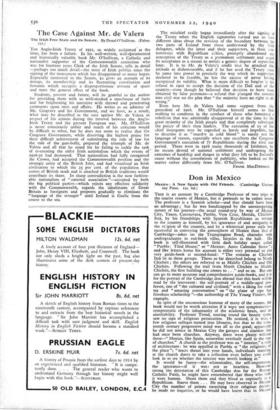The Case Against Mr. de Valera
The Irish Free State and its Senate. By Donal O'Sullivan. (Faber. 25S.)
THE Anglo-Irish Treaty of 1924 so widely acclaimed at the time, has been a failure. In his well-written, well-documented and historically valuable book Mr. O'Sullivan, a Catholic and nationalist supporter of the Commonwealth connexion who was for fourteen years Clerk of the Irish Senate, tells in detail —perhaps too much detail—the story of Irish politics since the signing of the instrument which has disappointed so many hopes. Especially interested in the Senate, be gives an account of its doings, its membership and its fluctuating constitution and fortunes which occupies a disproportionate amount of space and mars the general effect of the book.
Students, present and future, will be grateful to the author for providing them with so well-stocked a storehouse of facts and for brightening his narrative with shrewd and penetrating comments upon men and affairs. He writes as an admirer of Mr. Cosgrave and his Government, and we have, as a result, 'what may be described as the case against Mr. de Valera in respect of his actions during the interval between the Anglo- Irish Treaty and the present European war. Mr. O'Sullivan is never consciously unfair and much of his criticism would be difficult to rebut, but he does not seem to realise that the Cosgrave Government, while deserving the highest praise for their difficult achievement of substituting the rule of law for the rule of the gun-bully, prepared the triumph of Mr. de Valera and all that he stood for by failing to tackle the task of re-creating the older Irish nationalism which the events of 1916-21 had destroyed. That nationalism had fully recognised the Crown, had accepted the Commonwealth position and the strategic unity of the British Isles, and had visualised an Irish civilisation to which the 25 per cent, of the population that comes of British stock and is attached to British traditions would contribute its share. In sharp contradiction is the now fashion- able nationalism of "external association "—accepted by both the big political parties—which rejects any effective solidarity with the Commonwealth, regards the inhabitants of Great Britain as foreigners and proposes gradually to eliminate the "language of the stranger" until Ireland is Gaelic from the centre to the sea.
The mischief really began immediately after the signing of the Treaty when the English signatories turned out to have different ideas about the revision of the boundary between the two parts of Ireland from those understood by the Irish delegates, while the latter and their supporters, in their con. troversies with Republican critics, promptly abandoned any conception of the Treaty as a permanent settlement and urged its acceptance as a means to sere a reater degree of separation later. It is to Mr. de Valera's credit that he attacked this attitude as dishonourable, and if he has used the -Treaty since he came into power in precisely the way which its supporters declared to be feasible, he has the excuse of never having recognised its validity. What is more difficult to forgive is his refusal in 1922 to accept the decision of the Dail and of the country—even though he believed that decision to. have been obtained by false pretences—a refusal that plunged the country into civil war on the plea that "the majority have no right to do wrong."
Even here Mr. de Valera had some support from the precedent of 1916. Mr. O'Sullivan himself seems to find nothing to condemn in the conduct of those who fomented a rebellion that was admittedly disapproved of at the time by the great majority of the Irish people and that completely sabotaged the policy of their then leaders. The execution of 15 of the chief insurgents may be regarded as harsh and impolitic, but to describe it as " mur&r in cold blood" is surely not the language of reason, especially when one recollects the Cosgrave Government's execution of 77 Republicans during the civil war period. There were in 1916 many thousands Of Irishmen, by no means devoid of national sentiment and undergoing the extremes of hardship and danger in what they felt to be Ireland's cause without the consolations of publicity, who looked on the matter rather differently from Mr. O'Sullivan.
FRANK MAC.DERMOT.


























































 Previous page
Previous page